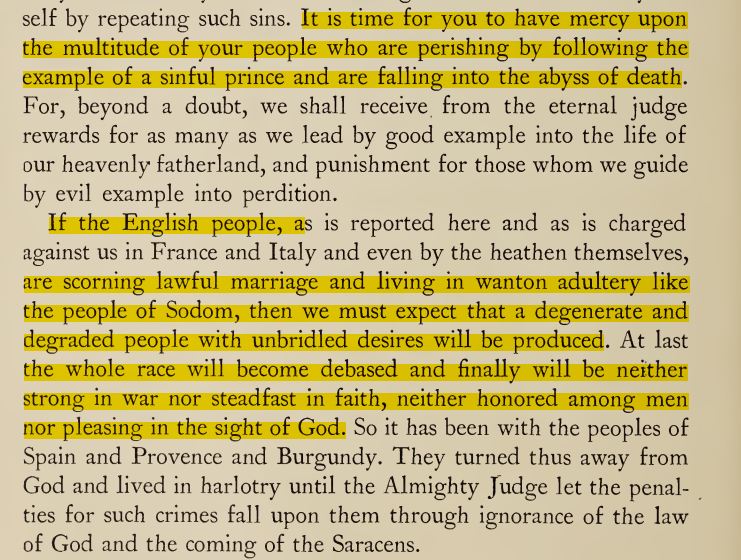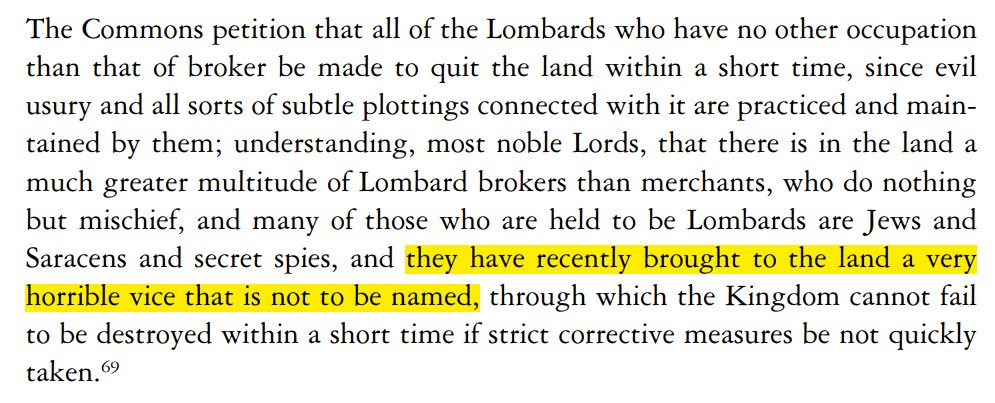Erik Wade here! Back with my 1st research thread as this week& #39;s host! I want to talk about early medieval sexuality studies. I focus on the earliest English writing on sex, starting in the first millennium CE.
(Cambridge, Corpus Christi College, MS 041, p 485) #MedievalTwitter
(Cambridge, Corpus Christi College, MS 041, p 485) #MedievalTwitter
I look at the connections between sex & ideas about race & nation in early England. Many scholars think about sex in terms of personal identity (did medieval ppl have an equivalent identity to the homosexual, etc). I argue that authors also saw sex as part of national problems.
This isn& #39;t a particularly NEW approach in *contemporary* queer & sexuality studies, which has been examining how the state & nation uses propaganda about sex for decades. But fewer medieval scholars consider the connections between sex & the state.
Sex often turns up in medieval English writing as a question vital to the kingdom & the people. When the missionary Augustine was converting the English, he wrote back to Pope Gregory the Great with 9 "urgent" questions. 4 were about sex, & Gregory answered those in most detail.
King Alfred, the first king to claim to be king of all England, had a biography written of himself by the Welsh cleric Asser as part of his propaganda campaign. It centers heavily on Alfred& #39;s sexual chastity as a symbol of his fitness to rule.
(Bodleian Lib MS Bodl. Rolls 5)
(Bodleian Lib MS Bodl. Rolls 5)
In 746/747, a group of bishops wrote an open letter to Mercian King Ethelbald, urging him to take a wife and stop sleeping with nuns, for the sake of the future of the kingdom and the English people& #39;s health.
The letter is WILD. They explain in detail why sleeping with nuns is Bad (bc they are CHRIST& #39;S wives, and it& #39;s stealing), then they try to show that even pagans rebuke such practices. Even the Wends, they state, "who are the vilest and lowest race of men," believe in marriage.
[TW: sexism, violence against women] Their arguments center around marriage but also, most importantly, control of women and women& #39;s sexuality. Even pagans, they claim, obey God& #39;s moral laws in terms of punishing women who commit adultery. Not mention of men, tho.
These pseudo-racial arguments lead into their major claim: that England and the English will be brought to ruin by bad sex practices if he& #39;s not careful. The English will imitate their king and fall into sin, producing a degenerate race like the ppl of Sodom.
The wildest part, to me, is their claim that this has *already* happened to Spain and thus God sent the Muslims to conquer them.
Sex (and control of women) becomes the marker of national and racial character, and foreign invaders punish sexual depravity.
Sex (and control of women) becomes the marker of national and racial character, and foreign invaders punish sexual depravity.
This is one example, from the introduction of my book project, but there are any number of similar stories from this period in which national sexual morality is required for a strong kingdom and for a race deserving of God& #39;s favor. Other peoples are sexually depraved.
You see this in the later Middle Ages too. Sodomy was often attributed to foreigners and enemies. After the Crusades, stories spread about how the Muslims *taught* sodomy to the Crusaders and that& #39;s how it made its way back to Europe.
In 1376, the English Commons released the following extraordinary report, warning that many Lombards living in England were secretly Muslims and Jews, spreading an unnameable vice (sodomy) among the Christians of England in order to destroy England.
Contemporary politics often link sex, race, & nation: a nation& #39;s "modernity" is often assessed (in Western media) by its sexual politics, & treatment of women and sexual minorities. Conservatives claim they will restore "values," traditional gender roles, etc.
The same thing, I argue, was happening in the earliest English writings. At the level of national propaganda, racial and national superiority were often marked through claims to sexual morality, while racial minorities were associated with perversity and rape.

 Read on Twitter
Read on Twitter



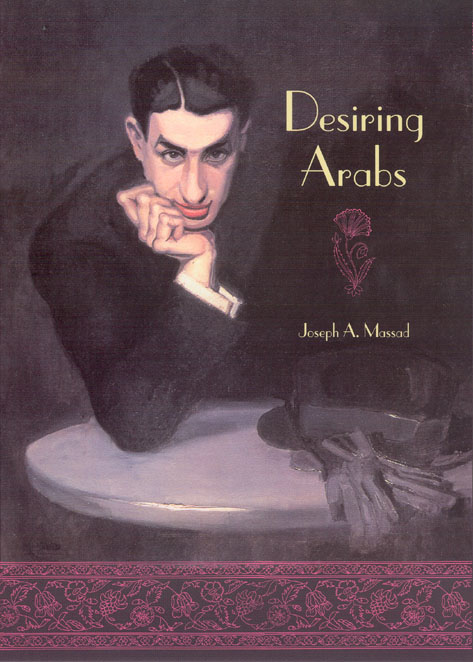
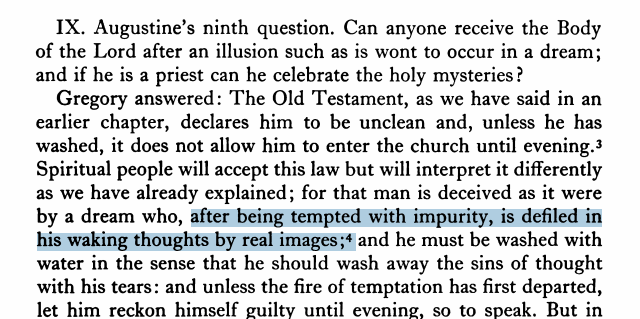

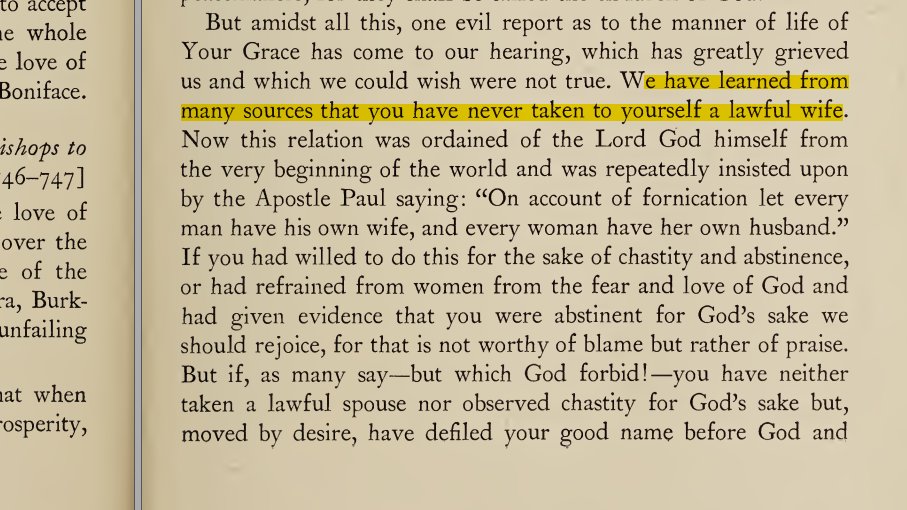
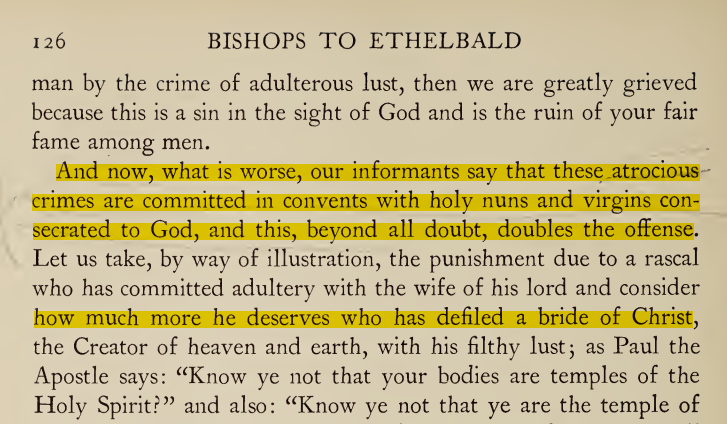
![[TW: sexism, violence against women] Their arguments center around marriage but also, most importantly, control of women and women& #39;s sexuality. Even pagans, they claim, obey God& #39;s moral laws in terms of punishing women who commit adultery. Not mention of men, tho. [TW: sexism, violence against women] Their arguments center around marriage but also, most importantly, control of women and women& #39;s sexuality. Even pagans, they claim, obey God& #39;s moral laws in terms of punishing women who commit adultery. Not mention of men, tho.](https://pbs.twimg.com/media/EgQM_dpWsAAMdbX.png)
